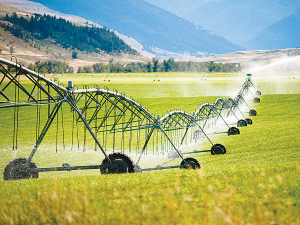Australian teams to help repair North Canterbury irrigators after storm
Moves are afoot to get a team of Australians over here to help repair North Canterbury's irrigation machinery, ravaged by the big windstorm of late October.
 Watermetrics says knowing the moisture in your soil to a good depth is crucial in irrigation decisions.
Watermetrics says knowing the moisture in your soil to a good depth is crucial in irrigation decisions.
Do you know what’s happening in your soil? Water usage and productivity company Watermetrics believes it’s essential for farmers to know this.
The company says a proper soil probe will give farmers accurate information in terms of moisture and temperature.
For example, you can use different forms of nitrogen but it is best not applied when the top 10cm soil temperature is less than 6 degree C.
The company says knowing the moisture in your soil to a good depth is crucial in irrigation decisions. “The more we observe the more confident we are that you can save 20% of your water and still get more growth,” it says.
“You can’t do that without knowing what’s going on in the soil at all levels. Gaining knowledge and understanding of what the best moisture levels are in your soil, you can ensure you are in the best position to get the best growth and take account of seasonal changes.”
Farmers also need to report on nutrient washout and the reasons they irrigated at a certain time.
Watermetrics says this environmental reporting is important and good records satisfy this requirement. An inferior probe will not achieve this.
“The market is full of very ordinary probes, some that have to be dug in, and others give pretty poor information. They do not represent a sound investment. Things like signal cost, frequency of reading, accuracy of probe placement and verification of correct data are important. To do the job properly you need 100mm readings to at least a 500mm depth so you really can see what’s happening.”
They also need connection to a powerful data transfer network. Watermetrics says its Lora network successfully services thousands of farms throughout New Zealand. A recent upgrade has lifted that performance “to world standard data transfer”.
The company says it presents data in meaningful and easy to connect with ways.
“We connect flow data, climate information and soil information in graphical form that makes management decisions easy.”
With spring here, farmers need to make important farm management decisions to make particularly in fertiliser use and irrigation.
“Decisions made now are reflected in your physical and financial performance for the whole year and it’s hard to play catch up for a poor beginning,” it says.
“With dairy the cows have to have good condition by calving and if you do that you can feed them up to maximize the peak of the lactation curve, which is critical in terms of maximising the overall lactation and the amount of solids you have to sell.
“Factors you have to play with are stocking rate, winter grazing, supplement use, nitrogen and irrigation. Best combination of these will give you plenty of feed and with that comes high production and good cow condition going forward.
Farmers are being encouraged to take a closer look at the refrigerants running inside their on-farm systems, as international and domestic pressure continues to build on high global warming potential (GWP) 400-series refrigerants.
As expected, Fonterra has lifted its 2025-26 forecast farmgate milk price mid-point to $9.50/kgMS.
Bovonic says a return on investment study has found its automated mastitis detection technology, QuadSense, is delivering financial, labour, and animal-health benefits on New Zealand dairy farms worth an estimated $29,547 per season.
Pāmu has welcomed ten new apprentices into its 2026 intake, marking the second year of a scheme designed to equip the next generation of farmers with the skills, knowledge, and experience needed for a thriving career in agriculture.
One team with 43 head, including a contingent from Mid Canterbury, are reflecting on a stellar NZ DairyEvent.
Fonterra farmer shareholders have approved the mechanism for a $2/share capital return expected from the sale of its global consumer and associated businesses.
OPINION: Staying with politics, with less than nine months to go before the general elections, there’s confusion in the Labour…
OPINION: Winston Peters' tirade against the free trade deal stitched with India may not be all political posturing by the…